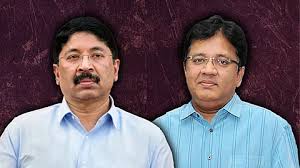Exclusive: Marans patch up — how Stalin, Veeramani and N Ram brokered peace

After years of a public and bitter fallout, Dayanidhi and Kalanithi Maran have finally reconciled. Their reunion wasn’t accidental. Tamil Nadu Chief Minister M K Stalin, Dravidar Kazhagam president K Veeramani, and senior journalist N Ram played key roles in ending the long-standing rift.
This reunion changes more than just family ties. It has deep political and media implications in Tamil Nadu.
A Feud That Divided a Family and a Party
The Maran brothers had not spoken for nearly two decades. Dayanidhi, a senior DMK leader and former Union Minister, had fallen out with Kalanithi, the powerful head of Sun Network. The feud reportedly began over business differences but soon turned personal.
Their silence extended to public and private spaces. Neither brother attended family functions if the other was present. Within the DMK, the fallout created visible cracks and forced party leaders to walk on eggshells.
Why Stalin Stepped In
With the 2026 Assembly elections approaching, Stalin wanted to present a united DMK front. He understood that the brothers’ cold war was a liability. The party needed to avoid internal distractions. He initiated the peace process discreetly, using his personal influence.
Stalin did not want a media circus. His approach was subtle, focused on trust-building and shared legacy. According to insiders, he urged both brothers to think beyond ego.
Veeramani’s Moral Appeal
K Veeramani brought in a voice of ideology. As the head of the Dravidar Kazhagam and a respected elder in the Dravidian movement, he had moral weight. Veeramani reminded both brothers of their grandfather Murasoli Maran’s legacy and the larger Dravidian cause.
In private talks, he emphasized unity. “At a time when Dravidian values face challenges, you must set an example,” he reportedly told them.
His appeal was not just emotional. It was grounded in ideology and legacy.
N Ram’s Quiet Diplomacy
N Ram, veteran journalist and former editor of The Hindu, played the role of mediator. He has long-standing ties with the Maran family. His involvement added credibility and neutrality to the process.
Rather than stage public interventions, Ram arranged quiet, off-the-record meetings. He helped both brothers speak freely and find common ground. His patient approach helped defuse years of tension.
The Day of Reconciliation
The final meeting took place in late June at a private home in Chennai. Stalin, Veeramani, and N Ram were present. The brothers greeted each other warmly for the first time in years.
There were no speeches or press statements—just a quiet agreement to move forward. Both brothers agreed to communicate more openly and avoid letting past issues interfere again.
The reunion was symbolic but also meaningful.
Why the Timing Matters
The reconciliation comes at a time of change in Tamil Nadu’s media and political spaces. With digital news rising, traditional TV media must adapt. A united Sun Group could play a big role in future election coverage.
For the DMK, this peace reduces internal tensions. It also boosts Dayanidhi Maran’s political standing. His ties with Stalin’s son Udhayanidhi could give him more influence in the years ahead.
Kalanithi Maran also benefits. The truce strengthens his image as a responsible family figure and business leader.
DMK Reacts with Hope and Caution
Party insiders welcomed the reunion but remain watchful. One senior leader said, “This is good news. But it must last.”
Cadres feel relieved. Many believe the Maran name still carries weight. A united front helps with campaigning and media reach.
The involvement of leaders like Stalin and Veeramani gives the truce strong backing. Most feel this time, it could be real.
Conclusion: A Fresh Start
The Maran brothers have chosen peace after years of silence. The process wasn’t easy. It took patience, persuasion, and quiet diplomacy. The involvement of Stalin, Veeramani, and N Ram made it possible.
This reunion isn’t just about two brothers. It signals a new alignment in Tamil Nadu’s political and media world. If it holds, it could shape the 2026 elections and beyond.
For now, the Marans are reunited. Whether the peace holds is a story for another day.






